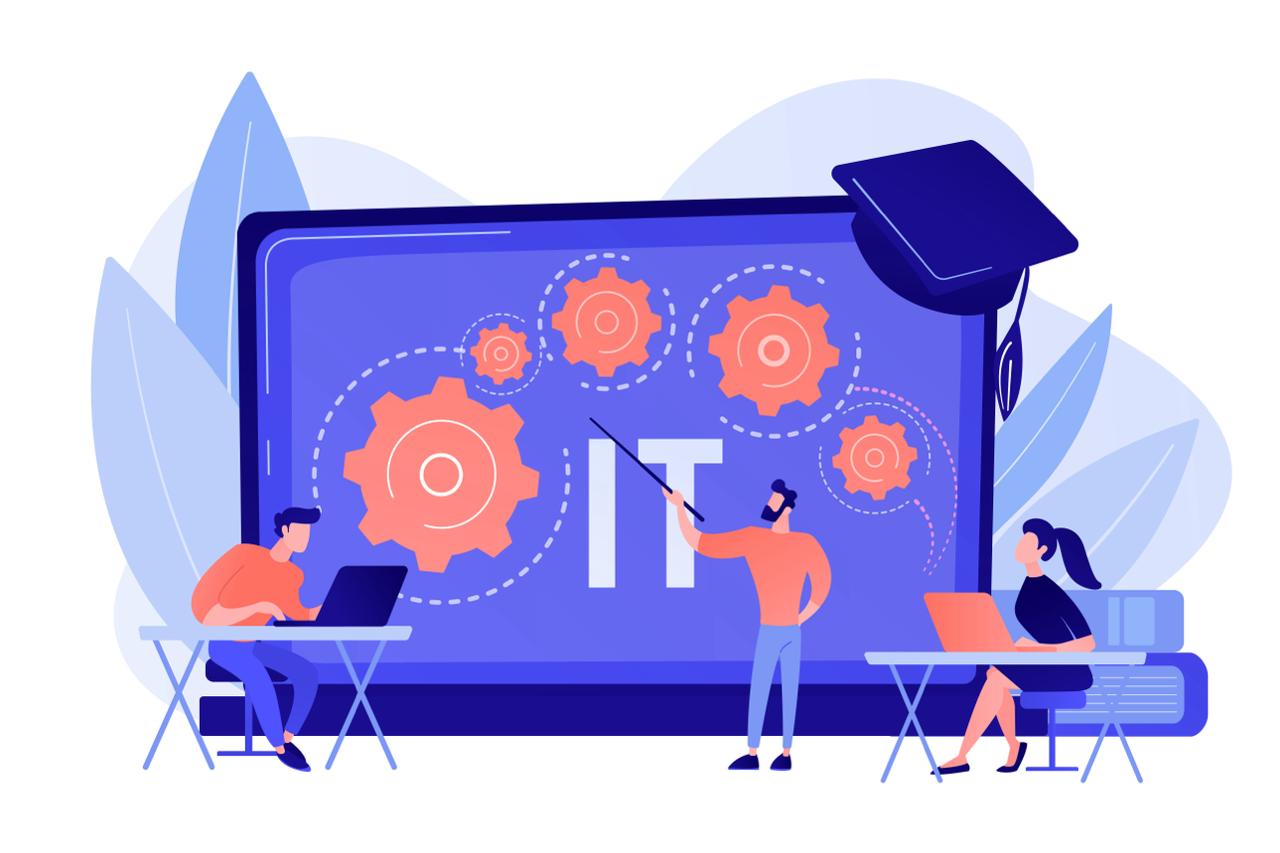
Internship at an IT Company in Minsk
An internship is one of the most effective ways for young professionals and students to gain practical experience, get acquainted…
An internship is one of the most effective ways for young professionals and students to gain practical experience, get acquainted with real work processes, and take their first steps toward a career. IT internships are especially in demand, as tech companies play a key role in Belarus’s economy and are rapidly growing, offering wide opportunities for talented newcomers.
Minsk, the capital and largest technology hub of Belarus, is home to a diverse range of IT companies—from startups to international corporations. An internship at an IT company in Minsk is a chance not only to apply the theoretical knowledge gained at university but also to master modern development tools, learn project management methodologies, and receive mentorship from experienced professionals.
Given the high competition in the job market, successfully completing an internship often becomes the key to securing a full-time position in the IT field. In this article, we explore how IT internships in Minsk are structured, what employers expect, which areas are in demand, and how to make the most of this stage for building a successful career.
Why an IT Internship Matters
An internship is more than just a formal academic requirement or a way to enhance a resume. For an aspiring IT specialist, it plays a crucial role in building a successful career. In Minsk’s fast-paced IT industry, where competition is fierce an internship is often the first real step toward professional growth. Let’s look at the main reasons why this experience is so important.
1. Gaining Practical Skills
University education provides a solid foundation, but a successful career in IT requires the ability to apply that knowledge in real-world settings. An internship allows you to:
- Work on real projects and technologies used in the industry.
- Learn professional tools for development, testing, DevOps, and more.
- Understand the specifics of teamwork, communication, and task distribution.
- Solve practical problems that are difficult to replicate in an academic setting.
This kind of experience makes graduates significantly more competitive in the job market and helps them adapt quickly to the workplace.
2. Building Professional Connections
An internship is a great opportunity to meet colleagues, establish valuable contacts, and get support from experienced specialists. In the IT field, where teamwork and knowledge sharing are essential. А professional network can help you:
- Get faster answers to technical questions.
- Stay updated on new trends and technologies from first-hand sources.
- Receive job recommendations and support in your career search.
- Be invited to join interesting projects or roles based on your reputation.
Strong professional relationships often become the key to long-term career growth and new opportunities.
3. Employment Prospects and Career Growth
At most IT companies in Minsk, an internship is not just about learning, it also serves as a probationary period. Companies are interested in turning interns into full-time employees. Therefore:
- Interns who perform well are often offered permanent positions.
- The internship helps you understand the employer’s expectations and showcase your strengths.
- It’s a chance to join a reputable company with solid growth prospects.
Moreover, having internship experience at a respected IT company significantly increases your appeal to other employers.
Key Internship Areas in Minsk’s IT Sector
The range of internship opportunities in Minsk’s IT sector is broad and diverse, allowing each candidate to find a path that aligns with their interests and career goals. Below are the most in-demand areas in 2025.
1. Software Development (Frontend, Backend, Fullstack)
This is arguably one of the most popular internship tracks. Developers are responsible for building and maintaining software products such as websites, mobile apps, and enterprise systems.
- Frontend development focuses on user interfaces and the visual aspects of applications. Interns typically work with JavaScript, TypeScript, and popular frameworks/libraries like React, Angular, and Vue.
- Backend development deals with server-side logic, databases, and APIs, often using languages such as Java, Python, Go, and .NET.
- Fullstack development combines frontend and backend skills, enabling specialists to handle the entire software development cycle.
Interning in development provides foundational knowledge of the software lifecycle, Agile/Scrum teamwork, and hands-on experience with modern DevOps practices and tools.
2. Quality Assurance and Testing (QA)
QA specialists are responsible for ensuring the quality and reliability of software products. Internships in this area help students learn how to identify bugs, create automated tests, and maintain application stability.
- Interns learn manual testing techniques, how to write test cases, and report bugs.
- They are introduced to automation tools such as Selenium, Postman, and JUnit.
- They gain exposure to CI/CD processes and how QA integrates into the development cycle.
QA is a mission-critical area in software development, and skilled professionals are consistently in high demand.
3. Data Analytics and Machine Learning
With the rise of digital technologies and big data, analytics has become one of the most sought-after domains. Internships in this field are ideal for those interested in data analysis, modeling, and AI.
- Tasks may include data processing and visualization, building machine learning models, and predictive analysis.
- Interns use Python, R, and libraries such as TensorFlow, Scikit-learn, and Pandas.
- They also gain experience with databases, SQL, cloud platforms, and big data tools.
This fast-growing field offers promising career opportunities across industries like finance, marketing, healthcare, and manufacturing.
4. DevOps and System Administration
DevOps engineers streamline software development, deployment, and infrastructure management. Demand for such professionals is growing in Minsk as companies aim to deliver high-quality products faster.
- Interns work with containers (Docker, Kubernetes) and cloud platforms (AWS, Google Cloud, Azure).
- They learn to configure CI/CD pipelines, monitor systems, and manage server infrastructure.
- Scripting, automation, and security skills are also part of the training.
DevOps internships provide a deep understanding of IT infrastructure and help interns become the vital link between developers and system administrators.
5. Project Management and Business Analysis
For those interested in both technology and process coordination, internships in project management and business analysis offer valuable experience.
- Interns are introduced to project management methodologies such as Agile, Scrum, and Kanban.
- They develop skills in planning, risk assessment, and communication with both teams and clients.
- Training also includes requirement gathering, documentation, and product lifecycle support.
These internships can lead to roles such as project coordinator, business analyst, or product manager—positions that are essential for IT companies’ success and growth.
Internship Requirements for IT Candidates in Minsk
To successfully complete an internship at an IT company in Minsk and gain the most from the experience, it’s important to meet certain expectations. In 2025, employers increasingly value not just formal education, but also practical skills, personal qualities, and a candidate’s motivation. Below are the key criteria that can help you become a sought-after intern.
1. Education and Technical Knowledge
For most internship programs, candidates are expected to have a relevant educational background, typically in computer science, information technology, software engineering, mathematics, or related fields. It’s important to:
- Understand core programming concepts, algorithms, and data structures.
- Have basic knowledge in your chosen area, whether it’s software development, testing, analytics, or system administration.
- Be familiar with specific technologies or programming languages relevant to the company’s needs.
That said, a university degree is not always mandatory. Many companies value practical experience and a strong project portfolio just as much as formal credentials.
2. Programming Skills and Tool Proficiency
Hands-on experience is key to a successful internship. Employers typically evaluate:
- Knowledge of one or more programming languages (such as Python, Java, JavaScript, C#, etc.), depending on the role.
- Experience with version control systems like Git and an understanding of collaborative development practices.
- Familiarity with specialized tools—IDEs, testing frameworks, databases, cloud platforms, and more.
- For non-technical tracks—proficiency with data analysis, project management, or other relevant software.
Demonstrating a willingness to continuously improve and learn new tools or technologies is highly valued.
3. English Language and Communication Skills
The IT sector in Minsk actively collaborates with international clients and teams, making English proficiency almost a must:
- Your level of English should be sufficient to read technical documentation, communicate with your team, and participate in meetings.
- Strong communication skills help you collaborate effectively with colleagues, mentors, and stakeholders.
- The ability to clearly express your thoughts, ask questions, and receive feedback is just as important as technical expertise.
Developing soft skills is a critical part of internship readiness.
4. Motivation and Willingness to Learn
One of the most important selection criteria is a candidate’s personal motivation and desire to grow:
- Employers look for proactive candidates who show genuine interest in the field and are willing to invest effort in their professional development.
- Openness to challenges, the ability to learn from mistakes, and receptiveness to feedback are essential.
- Adaptability to fast-paced environments and new technologies is key.
- A positive attitude and perseverance can help you get the most out of your internship and build a foundation for future employment.
A strong internship candidate in Minsk’s IT industry combines basic technical education and hands-on skills with a good command of modern tools, solid English, and a drive to grow and learn. These are the traits that turn interns into valuable team members and launch successful careers in the dynamic world of tech.
Internship Experience in 2025: Key Features and What to Expect
In 2025, the format and conditions of internships in IT companies in Minsk have evolved significantly, shaped by recent years’ experiences and ongoing changes in technology and corporate culture. Below are the key aspects to help you understand what to expect and how to prepare effectively.
1. Formats: Remote, Hybrid, and On-Site Internships
Modern IT companies now offer various internship formats:
- Remote internships have become a full-fledged alternative to on-site work. Interns get access to corporate systems, communicate with mentors and teams via video conferencing and messaging platforms. This format is ideal for students from other regions or countries, or for those who combine internship with their studies.
- Hybrid internships combine remote work with occasional visits to the office. This is a flexible and balanced approach for those who want to stay connected with the team while enjoying the convenience of remote work.
- On-site internships remain popular, especially for candidates who value in-person communication, quick access to support, and full immersion into the company culture. In 2025, IT offices in Minsk are equipped with modern amenities and creative workspaces.
2. Duration and Structure of Internships
Internships in Minsk’s IT companies usually last from 2 to 6 months, depending on the company and role:
- The first weeks typically involve introductory training, familiarizing interns with corporate processes, tools, and standards.
- The core of the internship focuses on hands-on tasks and participation in real-world projects.
- Many companies structure their internships around regular sprints, retrospectives, and team meetings, providing interns with exposure to Agile development practices.
In addition, many companies provide personalized onboarding plans that gradually increase task complexity to match the intern’s progress.
3. Learning Programs and Mentorship
Training is a key part of internships in 2025. Many IT companies offer:
- Webinars and in-house courses on current technologies and methodologies.
- Mentorship programs, where each intern is assigned an experienced mentor for technical guidance and organizational support.
- Practical workshops and training sessions, aimed at developing both technical and soft skills.
Mentorship and a collaborative learning environment significantly increase an intern’s chances of successfully completing the program and being offered a permanent role.
4. Performance Evaluation and Feedback
Effective feedback is a vital part of a successful internship:
- Interns receive regular feedback on their work from mentors and project leads.
- Companies conduct interim and final assessments to evaluate learning progress and identify areas for improvement.
- Many organizations use 360-degree feedback, incorporating insights from teammates and even clients.
Open and constructive communication helps interns adjust their approach, grow professionally, and allows companies to identify top talent for future hiring.
Benefits and Potential Challenges for Interns
An internship at an IT company in Minsk is an important step on the path to professional development. However, like any experience, it brings both significant advantages and certain challenges. Below are the main benefits and potential difficulties that interns may face in 2025.
Benefits
1. Real Projects and Team Experience
One of the biggest values of an internship is the opportunity to participate in real work processes. Instead of abstract assignments, interns handle specific tasks that impact the company’s or product’s development. This allows them to:
- Gain practical skills that are hard to acquire through self-study.
- Learn how teamwork is organized, including role distribution and communication inside an IT company.
- Master professional tools and adhere to industry standards.
2. Career Opportunities After the Internship
Successfully completing an internship often opens the door to a permanent job. Many employers consider interns as potential full-time employees and are ready to offer competitive positions with room for growth. Additionally:
- Internships help build a professional network that can be useful in the future.
- The experience significantly enhances a resume and improves chances of employment at other IT companies.
- For many interns, this is the first step toward participating in large-scale international projects and advancing their careers.
Potential Challenges
1. Competition
The IT industry in Minsk is growing rapidly, and the number of internship applicants is high. This means candidates face intense competition, requiring:
- A high level of preparation.
- Active skill development even before the internship begins.
- The ability to stand out through a strong portfolio, projects, or personal qualities.
2. Workload and Balancing Studies
Internships often require intense effort and a high level of engagement, which can be a challenge for students or those juggling other commitments:
- Time management and setting priorities are crucial.
- Interns need to stay motivated and resilient, especially during exam periods or tight project deadlines.
- The workload may be unpredictable at times, requiring flexibility and quick adaptation.
3. Dealing with Professional and Emotional Stress
Beginner specialists frequently face new tasks and expectations, which can trigger doubts and self-criticism:
- It’s important to accept constructive feedback and learn from mistakes.
- Maintaining a positive attitude and being open to asking questions is essential.
How to Make the Most of Your Internship
To benefit fully from an internship at an IT company in Minsk and build a strong foundation for a successful career, it’s essential to be proactive and dedicated. Below are key recommendations to help interns succeed and leave a positive impression on potential employers.
1. Self-Organization and Goal Setting
Internship success largely depends on your ability to plan your time and set priorities:
- Clearly define goals for each stage of the internship. This could include mastering certain technologies, completing a specific project, or developing specific skills.
- Use a planner or digital tools to manage tasks and track progress. This helps meet deadlines and maintain productivity.
- Be disciplined and responsible. Complete assignments on time, even if they seem difficult or mundane, as this demonstrates your reliability.
2. Active Interaction with Mentors and Colleagues
Communication and knowledge exchange are vital parts of a successful internship:
- Regularly ask questions and request clarification if something is unclear. Mentors appreciate initiative and are willing to help when they see genuine interest.
- Take initiative, share ideas, participate in discussions and team activities. This helps integrate into the team and increase your value.
- Pay close attention to feedback and use it to improve your skills and behavior.
3. Continuous Learning and Soft Skills Development
While technical knowledge is important, soft skills, such as communication, teamwork, and time management are just as valuable:
- Read professional literature, watch tutorials, and participate in internal training sessions. Many IT companies offer access to online courses and workshops.
- Develop communication, critical thinking, and problem-solving skills. These will benefit you not only during the internship but throughout your career.
- Monitor your emotional well-being and learn to manage stress. This increases resilience and productivity.
4. Preparing for Future Employment
An internship is not just about learning. It’s also a career opportunity:
- Create or update your resume, including your internship experience and specific achievements.
- Build a project portfolio showcasing the work you did during the internship to present to future employers.
- Establish professional connections and maintain contact with mentors and colleagues. These can lead to recommendations and job leads.
- Be ready for interviews. Practice presenting yourself and your projects confidently and clearly.
Conclusion
An internship at an IT company in Minsk is a significant step for anyone looking to build a successful career in information technology. It offers a unique opportunity to gain hands-on experience, work on real projects, and establish valuable professional connections. While challenges may arise, the right mindset, good organization, and proper support can help you make the most of this experience.
If you want to be confident in choosing the right internship and successfully navigating each stage, our career consultants are here to offer expert guidance and support. We will help you create a personalized development plan, prepare for interviews, and adapt to your new company ensuring your internship becomes the first step toward a bright and promising career in IT.
Reach out to us — and let’s achieve your goals together!
Our Blog
The latest news in our blog
HR Department and Building Corporate Culture
In modern companies, the role of the HR department has long gone beyond recruitment and personnel administration. Today, HR acts…
New Year’s Greetings From the Recruiting.by Team
The end of the year is not only a time to sum up but also a moment when it becomes…
A Complete Guide to Job Classification
The IT sector continues to develop actively, and with it, the diversity of positions, roles, and specializations within companies grows….
Contact
We’re available for the new projects



